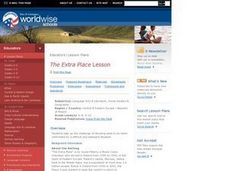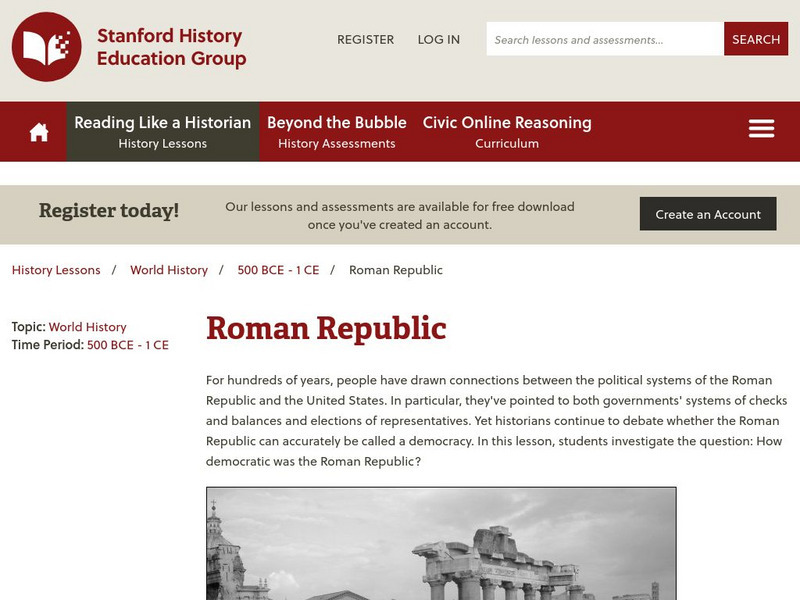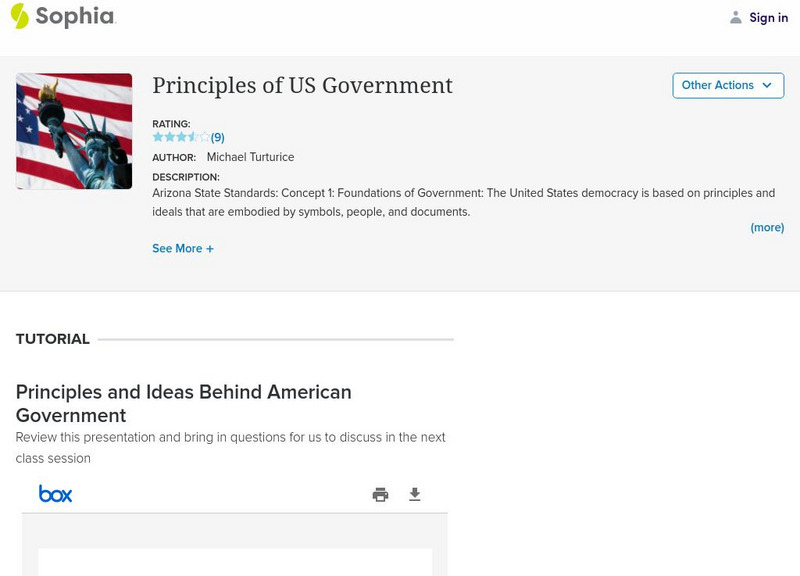Museum of Tolerance
Citizenship Then and Now: Comparing Ancient Rome and Contemporary American Society
Class members research citizenship in Ancient Rome and in the United States and use the provided graphic organizers to compare the rights and responsibilities of citizens in these two democracies.
Curated OER
The Legacy of Ancient Greece and Rome
Where did the inspiration for the US government system come from? From the ancient Greeks and Romans, of course. Scholars define nine terms relating to Greek and Roman government, complete a graphic organizer, and list the greatest...
Curated OER
Rome's Rise To Power: The Republic
Students investigate the government structure of ancient Rome. In this government systems lesson, students compare and contrast the government of ancient Rome with the government of the United States.
Curated OER
Baseball Challenge: Social Studies TCAP
Using a baseball theme, this presentation provides a review of social studies topics covered in sixth grade. Students play a game in which they score based on the answers to various questions involving Ancient Rome, Ancient Greece, map...
Curated OER
To Be or Not to Be Democratic
Seventh graders explore the democratic republic principles of U.S. government. In this U.S. government lesson plan, 7th graders compare and contrast the governments of ancient Athens,the Roman Republic, and the United States today....
Curated OER
Ancient Greece and Ancient Rome Unit Plan
High schoolers make two T charts, one for Sparta and one for Athens, showing pros and cons for living in either city-state. They use the physical information from the map and the cultural captions given for Athens and Sparts to come to...
Curated OER
The Republic; Roman History, Democracy
Students explain the ways in which current American system of government both resembles and differs from the system of government in Rome form about 510 to 264 B.C.
Museum of Tolerance
The Role of Citizens in a Participatory Democracy
Groups research participatory democracies and compare the role and rights of citizens in ancient history with those in recent U.S. history. Guided by a series of questions, individuals compose a persuasive essay in which they discuss the...
Curated OER
Ancient Rome and Greece
For this social studies worksheet students find the vocabulary terms in the word search. The answers are found by clicking the button at the bottom of the page.
Curated OER
Greece
In this comprehension instructional activity on Greece, students read the article presented and then answer the questions that follow. There are 12 short answer questions to complete about Greece, where it is located, the people,...
Curated OER
Neo-Classicism
Taking students from the origins of Neoclassical art, architecture, sculpture, painting, and decorative arts to the "sunset" of the artistic movement, this slideshow provides ample infomation and examples of the art form. The slides...
Curated OER
The Ides March On - Caesar Today
Learners make connections between the rule and reign of Julius Caesar and the leaders of other countries. They then create a news show that communicates their understanding of four essential questions that are included in the lesson.
Judicial Branch of California
Defining Civic Duty and Participation
A lesson, geared toward older elementary scholars, combines art with social studies to explain the purpose of civic duty and how to encourage others in the community to participate. Academics create advertising campaigns to promote civic...
Curated OER
The Extra Place Lesson
Students take up the challenge of deciding what to do when confronted by a difficult and awkward situation. They read the story and highlight sentences or phrases that have particular meaning to them and think about and discuss a...
Curated OER
The Extra Place
Students read and discuss the story of a Peace Corps volunteer's experiences in Poland. They read and write a response to the story, and participate in a class analysis about their own personal decision regarding the story.
Curated OER
The Extra Place Lesson
Students explore communication skills. In this Peace Corps lesson, students read "The Extra Place," by Susan Peters and discover Polish cultural traditions. Students consider how they would respond in a scenario that challenges their...
Stanford University
Stanford History Education Group: Roman Republic
[Free Registration/Login Required] Lesson using primary resources in which students investigate how democratic the Roman Republic was. Includes downloads for student materials, teacher mateials, PowerPoint, and original sources.
A&E Television
History.com: How Julius Caesar's Assassination Triggered the Fall of the Roman Republic
In the first weeks of 44 B.C., Caesar was proclaimed "dictator for life." His life, though, wouldn't last much longer. Fearful that the concentration of absolute power in a single man threatened the republic's democratic institutions,...
Forum Romanum
Outlines of Roman History: Institutions of Early Rome: The Early Roman Government
This article explains how early government of the Roman city-state evolved. The foundation of the government under the Roman Republic was established during the Roman monarchy.
BBC
Bbc: The Fall of the Roman Republic
Rome began as a democracy and ended as an autocracy. Find out why and how this happened by perusing the following summary. Included are all the major players from Tiberius to Julius Caesar and Augustus.
iCivics
I Civics: Cradle of Democracy Mini Lesson
No one person invented the kind of government that we have in the U.S. Check out two early governments that inspired the system that we have today: Athenian democracy, and the Roman Republic.
Ducksters
Ducksters: History of Ancient Rome for Kids: The Roman Republic
Kids learn about the Republic of Ancient Roman. This complex government with laws and representatives voted on by the people laid the groundwork for modern democracy.
iCivics
I Civics: Lessons From Antiquity
Where did democracy get its start? In this lesson, students learn about direct democracy in Athen's and Rome's republic, how each took shape, and the ideas our Founders borrowed from these great civilizations.
Sophia Learning
Sophia: Principles of u.s. Government
Tutorial presents an introduction to the principles of the United States democratic government highlighting the differences and similarities between Roman and U.S. governments.





















